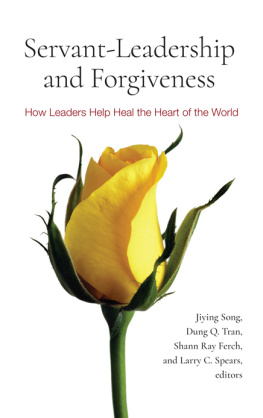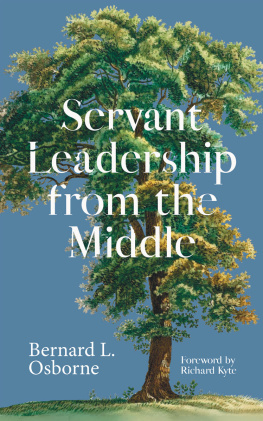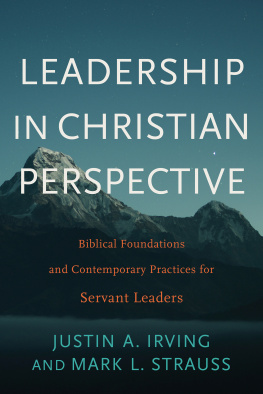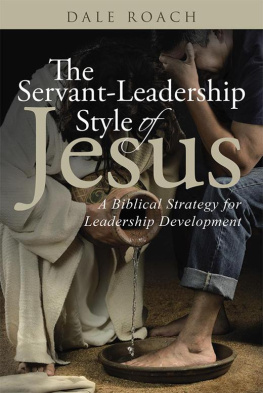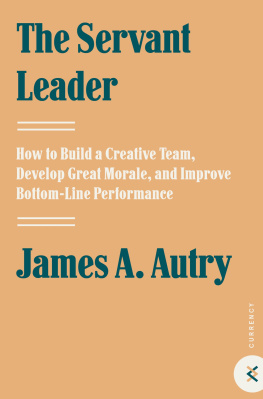Chapter 1
Awareness, Healing, and Forgiveness
Servant-Leaders Help Heal the Heart of the World
J IYING S ONG
Servant-leadership was not a leadership theory developed through empirical studies but a philosophy of life first articulated by Robert Greenleaf (19041990) (Beazley, 2003). Scholars and writers have criticized servant-leadership as soft (Ebener, 2011; Nayab, 2011) and lacking a coherent conceptual framework (Eicher-Catt, 2005), as an integrated theoretical development (van Dierendonck, 2011), and as empirical support (Northouse, 2016). In response to these critiques and public interest, some scholars and writers have organized servant-leadership into a variety of elements: characteristics (Liden, Panaccio, Meuser, Hu, & Wayne, 2014; Spears, 2002), behaviors (Liden et al., 2014), pillars (Sipe & Frick, 2009), dimensions (van Dierendonck & Nuijten, 2011), practices (Keith, 2008), attributes (Russell & Stone, 2002), subscales (Barbuto & Wheeler, 2006), subscores (Laub, 1999), and virtues (Patterson, 2003). Furthermore, Laub (1999), Liden et al. (2014), Patterson (2003), Russell and Stone (2002), and van Dierendonck (2011) have proposed theoretical models for servant-leadership.
However, these models have not fully addressed three characteristics of servant-leadership: awareness, healing, and forgiveness. The importance of awareness cannot be denied in Greenleafs (1966, 1996a, 2002, 2003) writings. When one is intensively aware, foresight and serving others become possible (Greenleaf, 2002). In addition, healing has been underappreciated in leadership (Barbuto & Wheeler, 2006); it is the most rare and perhaps the most needed characteristic of leaders today (Ferch, 2012, p. xi). Furthermore, forgiveness serves as an indispensable part of developing the kind of wisdom, freedom, autonomy, and health espoused by Greenleaf (Ferch, 2004). The significance of this chapter is to address a deficit in the literature; to add to the understanding of the concepts of awareness, healing, and forgiveness; and to build a theoretical model of servant-leadership. In this chapter, I will review (a) the concept of servant-leadership, (b) the 10 characteristics of servant-leadership, (c) servant-leadership and awareness, and (d) servant-leadership, healing, and forgiveness. I conclude that awareness, healing, and forgiveness are essential leading practices for servant-leaders. This chapter ends with a servant-leadership model developed through literature review.
The Concept of Servant-Leadership
Servant-leadership is not a new idea. In ancient China, the best leader was regarded as the least visible and least wordy. As Lao Tzu (2005) said, the best leader is one of whose existence the people are barely aware self-effacing and scanty of words. When his task is accomplished and things have been completed, all the people say, We ourselves have achieved it! (p. 35). Servant-leaders are not leaders who stand over people and control them but servants who keep their feet on the ground and benefit all things. Thus Lao Tzu said,
The highest form of goodness is like water.
Water knows how to benefit all things without striving with them.
It stays in places loathed by all men.
Therefore, it comes near the Tao.
In choosing your dwelling, know how to keep to the ground.
In cultivating your mind, know how to dive in the hidden deeps.
In dealing with others, know how to be gentle and kind.
In speaking, know how to keep your words.
In governing, know how to maintain order.
In transacting business, know how to be efficient.
In making a move, know how to choose the right moment.
If you do not strive with others,
You will be free from blame. (p. 17)
With this same spirit of servant-leadership, Jesus said to his disciples,
You know that among the Gentiles those whom they recognize as their rulers lord it over them, and their great ones are tyrants over them. But it is not so among you; but whoever wishes to become great among you must be your servant, and whoever wishes to be first among you must be slave of all. For the Son of Man came not to be served but to serve, and to give his life a ransom for many (Mark 10:4245, New Revised Standard Version).
As the son of God, Jesus emptied himself and took the form of a servant (Philippians 2:67). Preaching the kingdom of his father, Jesus led the way as a teacher, a sage, and a servant (Morse, 2008).
Sun Yat-sen (, 18661925) is the forerunner of the Democratic Revolution in China and the founding father of the Republic of China. He proposed the concept of public servants () (Sun, 1927), which is still widely used in China today. In the old days of the autocracy, an official was the servant of the monarch but the master of the rest of the people; after the Revolution of 1911, the people has become its own master and lord, and the officials should be the servants of the people (p. 165). Sun claimed, The State officials, beginning with the President and ending with an ordinary sentry, are all public servants (pp. 136137; emphasis added).
Robert K. Greenleaf was a Quaker thinker and servant-leader. When he retired from his career as director of management research at AT&T, he founded the Center for Applied Ethics in 1964 and devoted his life to leadership studies. In 1970, he published The Servant as Leader, a landmark essay that included the phrase servant-leader (for original 1970 edition, see Greenleaf, 2003). Drawing from his experiential leadership practice and deep Quaker spirituality, he coined the term servant-leadership and defined it as follows: The servant-leader is servant first. It begins with the natural feeling that one wants to serve, to serve first. Then conscious choice brings one to aspire to lead. That person is sharply different from one who is leader first (Greenleaf, 2002, p. 27; emphasis in original). With regard to discernment of a servant-leader, Greenleaf writes,
Do those served grow as persons? Do they, while being served, become healthier, wiser, freer, more autonomous, more likely themselves to become servants? And, what is the effect on the least privileged in society; will they benefit, or, at least, not be further deprived? (p. 27; emphasis in original)
The Center for Applied Ethics changed its name to Greenleaf Center for Servant Leadership in 1985. In 1990, Larry Spears was named CEO of the Greenleaf Center, and he visited Greenleaf eight days before he died. One year later, Spears discovered the existence of Greenleafs unpublished writings and established a committee to read through them. In 1992, Spears identified the 10 most frequently mentioned characteristics of servant-leadership by Greenleaf. Since then, Spears has devoted his life to introducing Greenleafs writings to the public (Spears Center for Servant-Leadership, 2018).
Greenleafs concept of servant-leadership is neither a set of procedures on how to lead well nor a quick-fix method but a state of mind, a philosophy of life, a way of being (Beazley, 2003, p. 10). Thus, it is necessary to bridge the gap between the philosophy and the practice of servant-leadership. Greenleaf (2003) himself offered a practical example of a fictional character in his Teacher as Servant. Through the story of Mr. Billings, Greenleaf portrayed a true servant-leader, who cares deeply about his students, nurtures the servant motive in them, and lives out his beliefs. In order to teach servant-leadership, leaders, scholars, and researchers have offered various characteristics, formulations, or models of servant-leadership. Through my literature review, I provide a summary of these contributions in . This is not an exhaustive summary. For more information, please see Eva et al. (2018), Laub (1999), van Dierendonck (2011), and Wong (2015).

